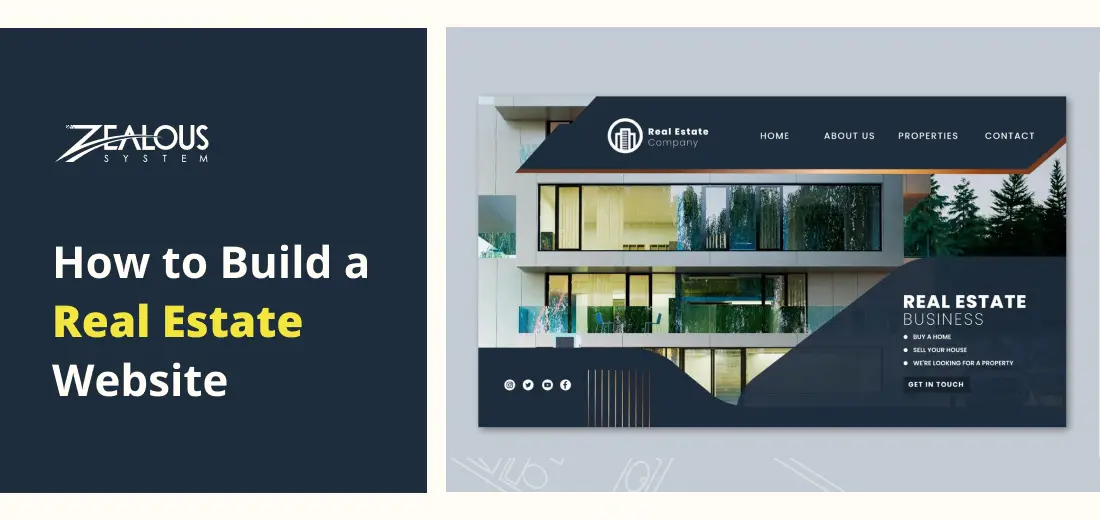
We use cookies and similar technologies that are necessary to operate the website. Additional cookies are used to perform analysis of website usage. please read our Privacy Policy
A Step-by-Step Guide To Develop Website for Real Estate Industry

A well-designed real estate website not only showcases properties effectively but also serves as a powerful tool for attracting potential clients. This step-by-step guide will walk you through the process of building a real estate website, ensuring it is user-friendly, visually appealing, and equipped with essential features.
In today’s digital age, a website is no longer optional for real estate agents or agencies. It’s your online storefront, your lead generation machine, and your brand ambassador all rolled into one. But where do you start? Don’t worry, we’ve got you covered with this comprehensive guide on building a real estate website that attracts clients, showcases properties, and converts leads.
Creating a real estate website that stands out in a competitive market involves a strategic and well-thought-out process. Follow these detailed steps to ensure your real estate platform is not just functional but also appealing and user-friendly.
10 Step-by-Step Guide to Building a Real Estate Website:
Step 1: Define Your Real Estate Goals and Target Audience
Before diving headfirst into website design, ask yourself the golden question: who are you trying to reach? Are you catering to first-time homebuyers seeking their dream starter homes, luxury property investors with discerning tastes, or a mix of both? Understanding your target audience will guide your website’s design, content strategy, and overall direction. Think about their demographics, needs, and online behavior to tailor your website accordingly.
Step 2: Choose a Domain Name and Hosting Provider
Your domain name is your online address, so choose wisely! Opt for something memorable, easy to spell, and reflective of your brand or area of expertise. A .com extension is widely recognized and generally recommended.
Next, you’ll need a hosting provider to store your website’s files and make it accessible online. Research different providers based on factors like cost, storage space, bandwidth, and customer support. Popular options include Zealous Hosting, Bluehost, SiteGround, and DreamHost.
Step 3: Select the Right Real Estate Website Building Platform
Several website building platforms cater specifically to real estate professionals. Popular choices include WordPress, Wix, Squarespace, and dedicated platforms like Agent Image and Real Geeks. Consider factors like ease of use, budget, customization options, and available real estate-specific features when making your decision. If you’re tech-savvy and want ultimate control, WordPress might be your best bet. If you prioritize ease of use and pre-built templates, Wix or Squarespace could be ideal.
Step 4: Design Your Real Estate Website
First impressions matter in the digital world, so invest in a professional-looking website with a clean, modern design. Consider collaborating with a website design agency in Australia to ensure your site reflects a high level of expertise. High-quality images and videos showcasing properties are crucial.
Remember, mobile browsing is king, so ensure your website looks and functions flawlessly on all devices. Platforms like Canva offer free design tools to help you create stunning visuals even without professional expertise.
Step 5: Implement Real Estate-Specific Features and Functionalities
This is where your website transforms from generic to “wow.” Integrate an MLS (Multiple Listing Service) feed for automatic listing updates, allowing visitors to effortlessly browse properties. Add features like interactive maps, virtual tours, and mortgage calculators to enhance their experience. Consider including client testimonials and success stories to build trust and credibility.
Step 6: Create High-Quality Real Estate Content
Don’t just list properties; educate and engage your audience! Create informative blog posts on local market trends, home buying tips, neighborhood guides, and other relevant topics. Share client testimonials and success stories to build trust and establish yourself as a thought leader. Regularly publishing fresh content keeps your website ranking higher in search engine results and engages visitors.
Step 7: Ensure Mobile Optimization
In today’s mobile-first world, a website that doesn’t function flawlessly on smartphones and tablets is practically invisible. Most website builders offer responsive design features that automatically adjust your website for different screen sizes. Test your website thoroughly on various devices to ensure a seamless user experience across the board.
Step 8: Implement Real Estate SEO Strategies
Organic traffic is gold for attracting potential clients. Use relevant keywords throughout your website content, optimize page titles and meta descriptions, and build backlinks from reputable sources. Consider consulting an SEO specialist for advanced strategies to boost your website’s ranking in search results.
Step 9: Launch and Promote Your Real Estate Website
It’s showtime! Launch your website with confidence and don’t wait for visitors to stumble upon it. Promote your website actively on social media platforms, online directories, local listings, and through email marketing campaigns. Engage with your audience, respond to inquiries promptly, and track your website analytics to see what’s working and what needs improvement.
Conclusion:
Building a successful real estate website requires dedication and continuous refinement. By following these steps and tailoring them to your unique brand and target audience, you can create a powerful online presence that attracts clients, generates leads, and propels your real estate business to new heights.
To ensure a seamless and professional development process, consider partnering with a reputable website development company in Australia. Remember, your website is an ongoing project, so keep it fresh, engaging, and optimized to stay ahead of the curve in the ever-evolving digital landscape. Now go forth and conquer the online world!
Read Also:
We are here
Our team is always eager to know what you are looking for. Drop them a Hi!
Pranjal Mehta
Pranjal Mehta is the Managing Director of Zealous System, a leading software solutions provider. Having 10+ years of experience and clientele across the globe, he is always curious to stay ahead in the market by inculcating latest technologies and trends in Zealous.
Table of Contents
×

Comments